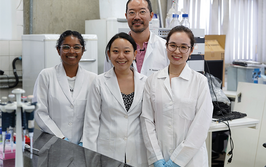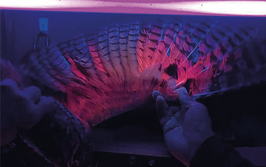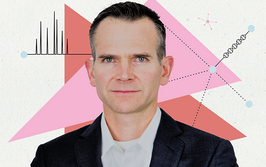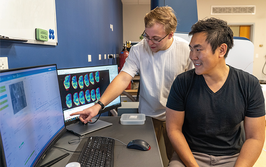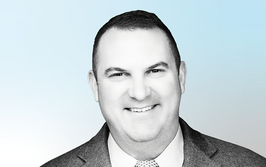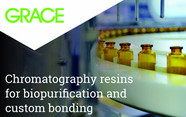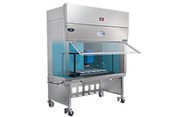Markes of Progress
Alun Cole and Liz Woolfenden, founders of Markes International and ALMSCO, were featured in “The Analytical Entrepreneur.” Here, they answer questions from The Analytical Scientist about the company and its development, and their approach to business.
What business experience did you have before setting up the company?
We both started off in sales and progressed through many different parts of a large organization – product development, product management and business management – and we got a good schooling in business development. Between us, we gained experience in most aspects of business and we saw the benefits and the disadvantages of working in a large organization, in terms of structure and process.
We were not so familiar with production and procurement, which is the other aspect to running a business. That’s probably typical of everyone going into business; you can’t know everything. But we learned fast and we had access to people who had technical knowledge in terms of engineering.
We also had close connections to the key movers and shakers in the market segment, which is a major plus.
How did it all come together?
From the beginning, we balanced an entrepreneurial, innovative approach with the development what would eventually be the company structure. That’s a powerful combination of risk-taking tempered with an understanding of how a multidisciplinary business needs to be structured.
We avoided becoming too focused on one aspect of running the business. It’s not uncommon for small business to start off with a great idea or passion, and fail to transfer it. They progress well in that single area but ultimately fail due to lack of focus on cash flow, quality or one of the other myriad things that you have to do in managing and running a business. The realities of life can smack you on the head. Our understanding of the need for an overarching framework helped avoid these problems and has been a key to success.
Did you, and do you still, spend 24 hours a day together?
It was pretty much 24 hours a day when we started the business, but we had a three-year-old who insisted that when we got home we had to do what three-year-olds want to do!
We’ve worked together throughout the lifetime of the company but there are a whole range of responsibilities involved and natural divisions of these. In the early days, Liz did brochures and started the website while Alun looked after the finances and liaised with the engineers to ensure that the project was on time. Today, we tend to work on the broader tasks together but the original division of labor has persisted and it works very well. It provides focus and allows us to get things done, rather than have interminable discussion about everything.
How has the company changed as it has grown?
The biggest challenge has been to put people in place who will make, more often than not, the correct decisions. Also, we have had to understand that they have to make those decisions.
When you start off, you are involved in every aspect of everything, every day, but that’s just not possible when you have 40-50 staff. Going from start-up mode to a formal organizational structure that gives people the freedom to exercise responsibility without us getting in the way is a difficult transition. We’ve worked very hard on it and we’ve sought advice. There is a natural grouping of people, around 10 or so, that work as a team and our approach has been to get those teams in place around a common goal. This maintains the entrepreneurial spirit but puts mechanism in place that helps employees feel that they have a structure and are part of a team.
Have you had success with consultants?
Consultants are getting a lot of knocks at the moment but we have had some excellent interactions. A start-up is an all-consuming passion, and the more focused you are, the greater the danger. The trouble is that you can end up believing that you know everything, because whatever you think of you can enact. But it might not be the right thing to do. A consultant can be the cool head that comes in and looks at things afresh. One of the first things we did, 6-8 months in, was to bring in a strategic consultant to give us general business advice, and we’ve subsequently had consultants in production, IT and so on.
These interactions helped you make big decisions to go ahead?
Yes, but decisions not to go ahead with certain things are important too, and these came out in the discussions. Sometimes you have to put a great idea on the back burner until you have more secure framework to work within. Then, you can take more risky decisions and still have stability if a project fails. For example, we invented a new technology about eight years ago which we didn’t bring to market until 2009.
Expanding the company is like repeating what you did when you started. If you have a listing or if you have external investors, they may take a more short-term view. We are a family business so we are not subject to those pressures. When you asked for advice for start-ups, we almost said ‘cash, cash and cash.’
That second phase has taken you into mass spectrometry. What convinced you to go in that direction?
The thing about thermal desorption is that it’s a fantastic business and the market is growing, but to have scalable growth we needed to move to a more general area. The customers that we wanted to appeal to all use mass spec. We became aware of a potentially powerful technology in its very early stages of development, and decided that we would acquire it, if it was scalable.
We talked to the customer base about a thermal desorption application with differentiation in the mass spectrometer and they were receptive. We took it on, and it moved the company to a different bracket, opened a different world. It is not just a bigger applications space; we had to look at distribution in a whole different way.
We are building a really expert sales force – not a lot of legs on the ground, but these are people who really know what they are doing. We now have operations in the US and will soon add Europe. Once we have the capability, we can channel all sorts of other products and it becomes a core capability alongside all the other things.
So is the company now primarily a mass spec company?
No. The company provides solutions to people who do organic analysis, primarily at trades levels. We have branded the mass spectrometer under a different name, ALMSCO, because it has different dynamics. The two branches, ALMSCO and Markes work together to produce customer-wide capability. You can’t look at one in isolation of the other.
Questions for Alun or Liz? Please feel free to post them in the comments section.
Alun Cole is Founding Director of Markes International, Llantrisant, UK.
